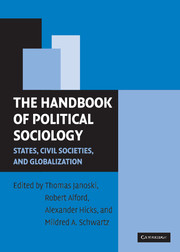Book contents
- Frontmatter
- Contents
- Preface
- Contributors
- Political Sociology in the New Millenium
- PART I THEORIES OF POLITICAL SOCIOLOGY
- 1 Rulemaking, Rulebreaking, and Power
- 2 Neopluralism and Neofunctionalism in Political Sociology
- 3 Conflict Theories in Political Sociology
- 4 Institutionalist and State-Centric Theories of Political Sociology
- 5 Culture, Knowledge, and Politics
- 6 Feminist Theorizing and Feminisms in Political Sociology
- 7 The Linguistic Turn: Foucault, Laclau, Mouffe, and Žižek
- 8 Rational-Choice Theories in Political Sociology
- 9 Theories of Race and the State
- PART II CIVIL SOCIETY: THE ROOTS AND PROCESSES OF POLITICAL ACTION
- PART III THE STATE AND ITS MANIFESTATIONS
- PART IV STATE POLICY AND INNOVATIONS
- PART V GLOBALIZATION AND POLITICAL SOCIOLOGY
- References
- Name Index
- Subject Index
1 - Rulemaking, Rulebreaking, and Power
Published online by Cambridge University Press: 05 June 2012
- Frontmatter
- Contents
- Preface
- Contributors
- Political Sociology in the New Millenium
- PART I THEORIES OF POLITICAL SOCIOLOGY
- 1 Rulemaking, Rulebreaking, and Power
- 2 Neopluralism and Neofunctionalism in Political Sociology
- 3 Conflict Theories in Political Sociology
- 4 Institutionalist and State-Centric Theories of Political Sociology
- 5 Culture, Knowledge, and Politics
- 6 Feminist Theorizing and Feminisms in Political Sociology
- 7 The Linguistic Turn: Foucault, Laclau, Mouffe, and Žižek
- 8 Rational-Choice Theories in Political Sociology
- 9 Theories of Race and the State
- PART II CIVIL SOCIETY: THE ROOTS AND PROCESSES OF POLITICAL ACTION
- PART III THE STATE AND ITS MANIFESTATIONS
- PART IV STATE POLICY AND INNOVATIONS
- PART V GLOBALIZATION AND POLITICAL SOCIOLOGY
- References
- Name Index
- Subject Index
Summary
Social life is inevitably organized by rules, whether these rules are rooted in custom or in the laws of an organized state. Rules are usually treated as ubiquitous, the most elementary feature of society. But obedience to rules cannot be taken for granted. People everywhere both conform to the rules that organize social life and violate them. In this chapter we explore the question of why women and men break the rules of their society and why they break particular rules. And we focus on this question because we think it illuminates the dialectic of power – of domination and resistance – in human relations.
The crux of our argument is that just as rule making is a strategy of domination, so is rule breaking a strategy in challenges to domination. We make our case in several steps. First, we discuss concepts of power and focus on the particular understanding of power as embedded in interdependent social relations that undergirds our argument. We contend that rule making and rule breaking can be understood as strategies to inhibit or activate the leverage inherent in contributions to social interdependencies. And finally, we briefly consider the bearing of theories of agency, of the human capacity for innovation, on the emergence of challenges to the rules.
Our interest in the bearing of rules on power arises from our career-long study of the dynamics of social movements, and particularly the unruly collective protests that periodically disrupt the normal workings of the American political system.
- Type
- Chapter
- Information
- The Handbook of Political SociologyStates, Civil Societies, and Globalization, pp. 33 - 53Publisher: Cambridge University PressPrint publication year: 2003
- 2
- Cited by



